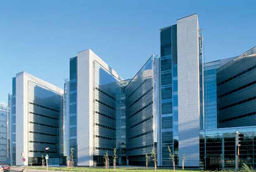Video Server
A Video Server is a dedicated video delivering device, which is designed to provision video. A video server’s work is to convert analog CCTV signal into a digital signal and allow the video to be viewed on a computer and record it to digital equipment. So, the ideal work function of a video server is to record videos, store them and play them in numerous video streams, without any degradation to the video signal.
A Video Server is also called as a Video Encoder and it facilitates the move towards a network video system, without having to discard existing analog equipment. Let us suppose, if there is a CCTV surveillance solution installed in place in a home or an enterprise environment. The equipment is fixed and is running to each camera. If suppose, one needs to convert the video to a digital format that facilitates video recording to a PC, which can be viewed on the internet, a video encoder or a video server comes in handy.
Since, new functionalities of analog equipment is possible without the need of dedicated equipment such as coaxial cabling, monitors and DVRs, video encoding is done through standard PC servers.
In certain circumstances, people need to deploy disguised bullet cameras, in their work environment. But if they need to have work functions of an IP network camera, then a video server will convert the analog video into digital and will make it available on internet, for remote access.
Video Servers are mainly utilized to store hundreds of hours of compressed videos, play out multiple and synchronized streams of video and offer quality interface such as SDI for digital videos, XLR for balanced analog audio, AES/EBU for digital audio and a time code. In order to avoid the need for timebase correction or frame synchronizers, Video Servers or Video Encoders are provided with a gunlock input, which works in sync with the house reference clock.
Video Servers offer a control interface allowing them to be driven by broadcasting automation systems that integrate with sophisticated broadcast programming applications. In order to prevent any wastage of time in transcoding, video servers can offer direct disk recording using the same codec that is used in various post production video editing software packages.
Features of Video Server
- Ingest of different sources through varied codec, which includes video cameras in multiple angles, satellite data feeds, disk drives and other video servers.
- Video feeds can be temporarily stored.
- In order to allow fast search of the appropriate metadata, there is a need to maintain a clear structure of all stored media. The fast search must include name, remarks, rating, date, time codec, frame numbers and so on…
- A Video server must offer convenient video editing of different clips.
- The need for the transfer of chips to other video servers or playout directly must also be allowed, which can be through IP interface or SDI.
Usage of Video Servers
- Video servers are used by news broadcasting channels, as it facilitates short news clips availability.
- These servers are used in media and entertainment stream, where storage and retrieval of content like film trailers & music videos is vital.
- In order to enhance live events with instant replays in sports field, Video Servers are used.
- For delivering online educative material in video format, the usage of video servers becomes essential.
- Video servers are used as public access in order to deliver city specific information to residents over a cable line.
- Video Surveillance field needs reliable and highly available video accessing platforms, in order to deliver real time video images of protected sites.
Video Servers deployment in the field of Video Surveillance
- In the field of Video Surveillance, an IP based Video server converts IP video streams from analog video signals and then it streams the digitized video content over IP networks (seen in the IP camera work functions).
- The streaming of content over the video servers is possible via modem for access over a phone or ISDN connection.
- With the help of a video server, the content from an analog camera surveillance system can be converted and sent to an IP surveillance system through a networked linkage.
- In a surveillance corridor, the video server acts as a device where one of more video sources can be attached.
- The existing video systems can be given network connectivity, with the help of video servers.
- Video servers are vital components for monitoring devices, telemetry and transmission.
- Through supplied video surveillance software, the viewing of video on video servers can be done via a web browser.
DNF Security
DNF Security is a subsidiary of Dynamic Network Factory headquartered in the heart of Sillicon Valley, CA.
©2020 Dynamic Network Factory
Follow us


